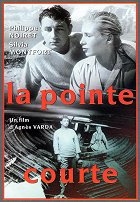Tartalmak(1)
The great Agnès Varda’s film career began with this graceful, penetrating study of a marriage on the rocks, set against the backdrop of a small Mediterranean fishing village. Both a stylized depiction of the complicated relationship between a married couple (played by Silvia Monfort and Philippe Noiret) and a documentary-like look at the daily struggles of the locals, Varda’s discursive, gorgeously filmed debut was radical enough to later be considered one of the progenitors of the coming French New Wave. (Criterion)
(több)Recenziók (2)
Varda had practically no experience with films or filmmaking prior to shooting her debut. The geometrically composed shots from unusual angles are inspired by the work of photographers such as Eugène Atget and Henri Cartier-Bresson (Varda herself began as a photographer) and the non-traditional structure, alternating (neo-realistic) anthropological scenes from the life of a fishing village (with non-actors) with lyrical scenes of dialogue by a pair of lovers (with actors) are based on Faulkner’s The Wild Palms. Interrupting the testimony on the difficult economic situation of fishermen and their families with the banal love story of a couple who seem uninterested in the outside world is intentionally frustrating and leads us to contemplate the relativity of the problems that seem significant to us in our lives. As in most of Varda’s subsequent works, the film’s dominant feature is contradiction, in this case particularly the contradiction between the social and the personal, documentary and performed. ___ The editor of the original, and in some ways slightly naïve and awkward, film was Alain Resnais, who introduced Varda to the cinephiles from the Cahiers du Cinéma clique and recommended that she start visiting the Cinémathèque in Paris. Though she did not know Visconti or any of the other directors whose influence contemporary reviewers perceived in her debut, she in fact surpassed the New Wave when she was the first to circumvent the system (it was common in France at that time to advance to the position of director through many years of serving as an assistant) and made a feature film very cheaply according to her own ideas, while rejecting the convention of formally staid and, in terms of reality, distant “dad cinema”. 70%
()
Not everyone immediately connects the little Belgian girl with the New Wave or its beginnings (that took a united party of men, prepared not only to make new films but also to loudly and confidently proclaim their entry into the history of cinema), yet her debut undoubtedly falls into a new era, bearing little in common with other films from the 1950s (indeed, why should Truffaut's debut be considered the symbolic beginning of the movement, and not La Pointe courte?). Smooth camera movements, lively editing, no awkward transitions, poverty without melancholy or moralizing, love that cannot definitively be said to escape or only escapes somewhere else, where it will be rediscovered anew, dialogues of a romantic couple that make one think (show me a film that does this from the 1950s, if not earlier, and I will be very grateful!), a film that exists between fiction and documentary without the desire to turn the story into a fairy tale or, conversely, an indictment, and a film that calmly flows, gradually ending and yet building up. This film only shares those four digits in the date of its creation with the 1950s.
()


Hirdetés